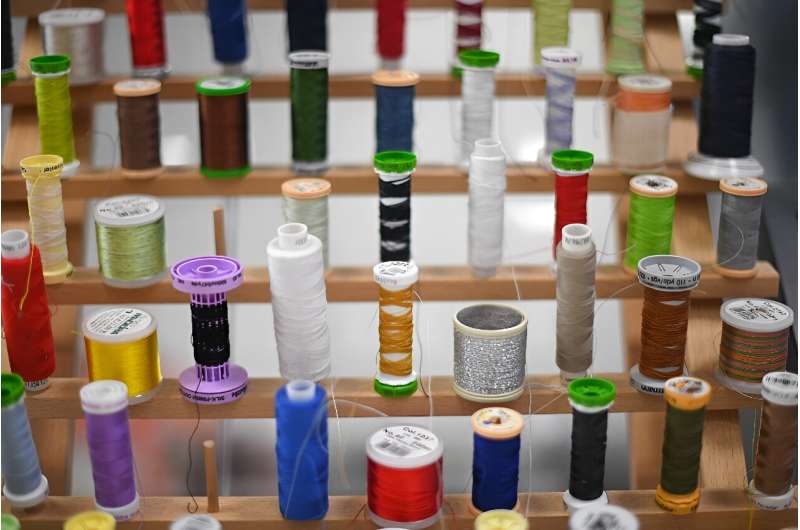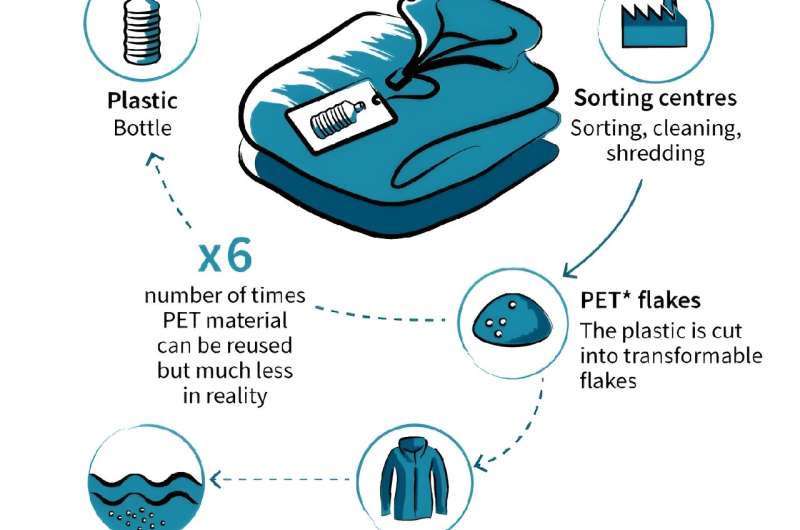
In H&M's flagship Paris store it is hard to find clothes that don't claim to be made from "recycled materials".
Last year, 79 percent of the polyester in its collections came from recycled materials, and next year it wants it all to be recycled.
The Swedish fast fashion giant told AFP that recycled material allows the "industry to reduce its dependence on virgin polyester made from fossil fuels".
The problem is that "93 percent of all recycled textiles today comes from plastic bottles, not from old clothes", said Urska Trunk of campaign group Changing Markets.
In other words, from fossil fuels.
And while a plastic bottle can be recycled five or six times, a T-shirt in recycled polyester "can never be recycled again", said Trunk.
Almost all recycled polyester is made from PET (polyethylene terephthalate) from plastic bottles, according to the non-profit Textile Exchange.
In Europe, most textile waste is either dumped or burned. Only 22 percent is recycled or reused—and most of that is turned into insulation, mattress stuffing or cleaning cloths.
"Less than one percent of fabric used to produce clothing is recycled into new clothing," the European Commission told AFP.
Recycling textiles is "much more complex than recycling other materials, such as glass or paper", according to Lenzing, an Austrian manufacturer famous for its wood-based fibers.

Unrecyclable
For a start, clothes made from more than two fibers are for now regarded as unrecyclable.
Those clothes that can be recycled must be sorted by color, and then have zips, buttons, studs and other material removed.
It is often costly and labor intensive, say experts, though pilot projects are beginning to appear in Europe, said Greenpeace's Lisa Panhuber.
However, the technology "in its infancy", according to Trunk.
Reusing cotton may seem like the obvious answer. But when cotton is recycled, the quality drops so much it has often to be woven with other materials, experts say, bringing us slap back to the problem of mixed fabrics.
To square the recycling circle, fashion brands have instead been using recycled plastic—to the anger and frustration of the food industry, which pays for the collection of the used PET bottles.

"Let's be clear: this is not circularity," the beverage industry wrote in a withering open letter to the European Parliament last year, denouncing the "worrying trend" of the fashion industry making "green claims related to the use of recycled material".
Recycling polyester is another dead end, according to Lauriane Veillard, of the Zero Waste Europe (ZWE) network.
It is often impure and mixed with other materials like elastane or Lycra, which "prevents any recycling", she insisted.
Jean-Baptiste Sultan, of the French NGO Carbone 4, is equally damning of polyester. "From its manufacture to its recycling, (polyester) pollutes water, air and the soil."
In fact, environmental groups have been demanding that the textile industry stops making polyester entirely—despite it accounting for more than half of their output, according to Textile Exchange.

Carbon footprint
So where do all those mountains of unrecyclable polyester and mixed fabrics end up after Western consumers dutifully bring them to recycling bins?
© 2024 AFP
Citation: Why fashion's 'recycling' is not saving the planet (2024, February 7) retrieved 7 February 2024 from https://techxplore.com/news/2024-02-fashion-recycling-planet.html
This document is subject to copyright. Apart from any fair dealing for the purpose of private study or research, no part may be reproduced without the written permission. The content is provided for information purposes only.
